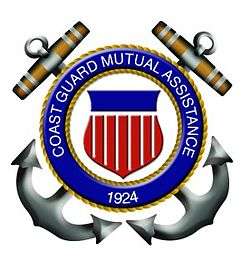Coast Guard Mutual Assistance
The Coast Guard Mutual Assistance (CGMA) is an independent non-profit charitable organization of United States Coast Guard people assisting the Coast Guard family, including active duty, retired military, Coast Guard civilian employees, Coast Guard Reserve, Coast Guard Auxiliary, Public Health Service officers serving with the Coast Guard, and surviving family members.[1] It receives no government funding, and has provided more than $200 million in financial assistance since 1924. There are more than 400 CGMA Representatives at 96 shore units and 38 cutters based in 32 states and territories, including Puerto Rico and Guam. CGMA receives no federal funds, and relies on bequests and donations from Coast Guard people. Most assistance is provided through interest-free loans and personal grants. These include educational support for members and their dependents, emergency travel, temporary living expenses, funeral expenses, loss of funds or property, disaster relief, medical and dental expenses, home studies expenses for adoptions, and debt management. The Supplemental Education Grant (SEG) program was enhanced in 2015.[2] There is also a Layette Program to welcome infants.[3] In 2017 CGMA provided 6 million dollars in direct assistance (loans and grants) to its clients. Since 1924 CGMA has provided more than $187 million in assistance. CGMA has a four-star rating from Charity Navigator.[4]
 | |
| Motto | Serving the men and women of the U.S. Coast Guard since 1924 |
|---|---|
| Founded | 1924 |
| Location |
|
Key people | Admiral Karl L. Schultz, Chairman; Rear Admiral Joanna M. Nunan, President; Rear Admiral (RET) Cari Thomas, CEO |
| Website | www.cgmahq.org |
Governance
CGMA is governed by a board of directors called the Board of Control (BOC). The officers of the corporation include the Commandant of the Coast Guard, the Assistant Commandant for Human Resources, the Master Chief Petty Officer of the Coast Guard, and the executive director of CGMA. The members of the BOC who are elected represent the constituencies served by CGMA. Monthly meetings are held at Coast Guard Headquarters in Washington, DC, and members generally reside in the greater DC area.[5]
History
- 1924—The League of Coast Guard Women is founded
- 1941—Coast Guard Welfare is established and assumes the League's mission
- 1979—Name changes to Coast Guard Mutual Assistance
- 1998—CGMA is incorporated in the Commonwealth of Virginia
- 2005—CGMA distributes $3 million in direct aid to families affected by Hurricanes Katrina, Rita, and Wilma
- 2017—CGMA distributes more than $2.6 million in direct aid to families affected by Hurricanes Harvey, Irma, and Maria, and provides $6.3 million in assistance to more than 5,200 Coast Guard families through interest-free loans and grants
- 2018--CGMA provides $5.3 million in essential financial aid to more than 5,000 Coast Guard families
References
- "Welcome to Coast Guard Mutual Assistance". Cgmahq.org. Retrieved 18 November 2018.
- "Changes to Coast Guard Mutual Assistance program « Coast Guard All Hands". Allhands.coastguard.dodlive.mil. Retrieved 18 November 2018.
- "Navigating CGMA - Layette Program". Cgmahq.org. Archived from the original on 18 November 2018. Retrieved 18 November 2018.
- "Charity Navigator - Rating for Coast Guard Mutual Assistance". Charitynavigator.org. Retrieved 18 November 2018.
- "CGMA - Board of Control". Cgmahq.org. Archived from the original on 18 November 2018. Retrieved 18 November 2018.